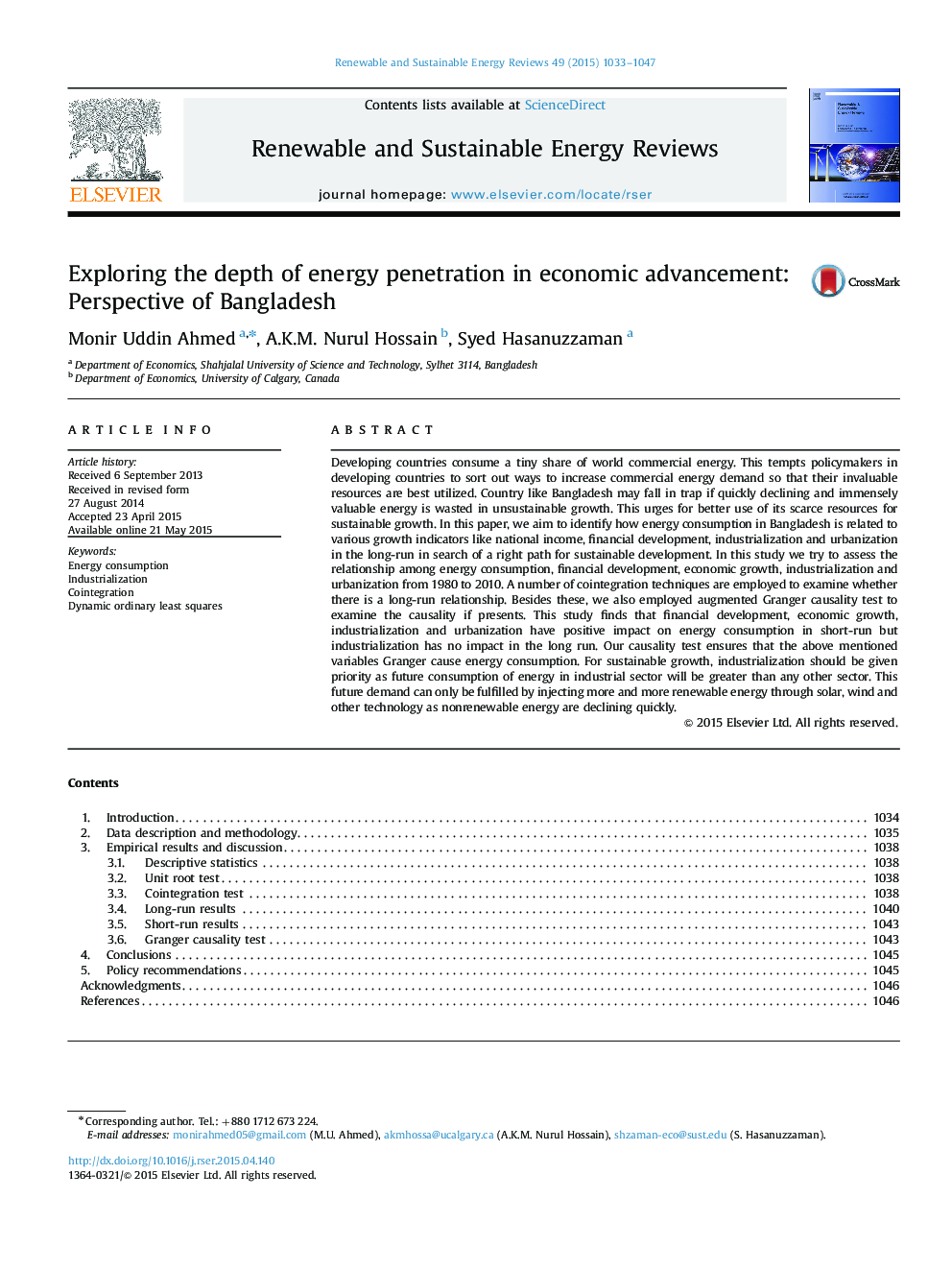| کد مقاله | کد نشریه | سال انتشار | مقاله انگلیسی | نسخه تمام متن |
|---|---|---|---|---|
| 8116972 | 1522336 | 2015 | 15 صفحه PDF | دانلود رایگان |
عنوان انگلیسی مقاله ISI
Exploring the depth of energy penetration in economic advancement: Perspective of Bangladesh
ترجمه فارسی عنوان
بررسی عمق نفوذ انرژی در پیشرفت اقتصادی: چشم انداز بنگلادش
دانلود مقاله + سفارش ترجمه
دانلود مقاله ISI انگلیسی
رایگان برای ایرانیان
کلمات کلیدی
مصرف انرژی، صنعتی سازی، هم انباشتگی، کمترین مربع معمولی دینامیک،
ترجمه چکیده
کشورهای در حال توسعه سهم کوچکی از انرژی تجاری جهان را مصرف می کنند. این وسوسه را برای سیاست گذاران در کشورهای در حال توسعه به منظور یافتن راه هایی برای افزایش تقاضای انرژی تجاری، به طوری که منابع ارزشمند آنها بهترین استفاده می شود. کشور مانند بنگلادش ممکن است در دام افتادن به سرعت در حال کاهش است و انرژی فوق العاده با ارزش در رشد نامطلوب از دست رفته است. این امر برای استفاده بهتر از منابع کمیاب آن برای رشد پایدار ضروری است. هدف از این مقاله شناسایی نحوه استفاده از انرژی در بنگلادش با شاخص های مختلف رشد مانند درآمد ملی، توسعه مالی، صنعتی شدن و شهرنشینی در بلند مدت است که به دنبال راهی مناسب برای توسعه پایدار است. در این تحقیق سعی شده است رابطه بین مصرف انرژی، توسعه مالی، رشد اقتصادی، صنعتی شدن و شهرنشینی از سال های 1980 تا 2010 بررسی شود. برای بررسی رابطه ای طولانی مدت، از روش های تلفیقی استفاده شده است. علاوه بر این، ما همچنین آزمون علیت گرنجر را برای بررسی علیت در صورت ارائه، مورد استفاده قرار دادیم. این مطالعه نشان می دهد که توسعه مالی، رشد اقتصادی، صنعتی شدن و شهرنشینی تأثیر مثبت بر مصرف انرژی در کوتاه مدت دارند، اما صنعتی شدن در بلند مدت تاثیری ندارد. تست علیت ما تضمین می کند که متغیرهای فوق گرنجر سبب مصرف انرژی می شود. برای رشد پایدار، صنعتی شدن باید اولویت داده شود زیرا مصرف انرژی آینده در بخش صنعتی بیشتر از هر بخش دیگر است. این تقاضای آینده تنها با تزریق انرژی تجدیدپذیر بیشتر و بیشتر از طریق انرژی خورشیدی، بادی و دیگر فناوری های دیگر به دست می آید زیرا انرژی غیر قابل احیاء به سرعت کاهش می یابد.
موضوعات مرتبط
مهندسی و علوم پایه
مهندسی انرژی
انرژی های تجدید پذیر، توسعه پایدار و محیط زیست
چکیده انگلیسی
Developing countries consume a tiny share of world commercial energy. This tempts policymakers in developing countries to sort out ways to increase commercial energy demand so that their invaluable resources are best utilized. Country like Bangladesh may fall in trap if quickly declining and immensely valuable energy is wasted in unsustainable growth. This urges for better use of its scarce resources for sustainable growth. In this paper, we aim to identify how energy consumption in Bangladesh is related to various growth indicators like national income, financial development, industrialization and urbanization in the long-run in search of a right path for sustainable development. In this study we try to assess the relationship among energy consumption, financial development, economic growth, industrialization and urbanization from 1980 to 2010. A number of cointegration techniques are employed to examine whether there is a long-run relationship. Besides these, we also employed augmented Granger causality test to examine the causality if presents. This study finds that financial development, economic growth, industrialization and urbanization have positive impact on energy consumption in short-run but industrialization has no impact in the long run. Our causality test ensures that the above mentioned variables Granger cause energy consumption. For sustainable growth, industrialization should be given priority as future consumption of energy in industrial sector will be greater than any other sector. This future demand can only be fulfilled by injecting more and more renewable energy through solar, wind and other technology as nonrenewable energy are declining quickly.
ناشر
Database: Elsevier - ScienceDirect (ساینس دایرکت)
Journal: Renewable and Sustainable Energy Reviews - Volume 49, September 2015, Pages 1033-1047
Journal: Renewable and Sustainable Energy Reviews - Volume 49, September 2015, Pages 1033-1047
نویسندگان
Monir Uddin Ahmed, A.K.M. Nurul Hossain, Syed Hasanuzzaman,
